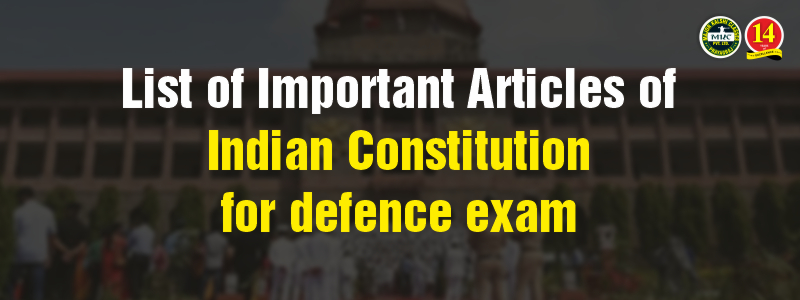List of Important Articles of The Indian Constitution for defence exam
Important Articles of The Indian Constitution:- The Constitution of India is a written constitution. At present 448 articles, 25 parts, and 12 schedules are available. The original constitution made in 1950 has 395 articles while 22 parts and 8 schedules are available. As you all know that the Constitution of India was prepared by closing on 29 November 1949 and which was implemented on 26 January 1950 throughout India. Through today’s article, we are going to give you detailed information about some such articles which are necessary for army recruitment.
List of Important Articles of the Indian Constitution:-
| Important Articles | Features |
| Articles 1 | The names of all the territories and unions of India are mentioned in this article. |
| Articles 3 | Article 3 provides for the creation of new states and the alteration of the territories and boundaries of existing states or the names of existing states. |
| Articles 13 | The right exists about laws inconsistent with or imitating our Fundamental Rights. |
| Articles 14 | It empowers all to get equality before the law. |
| Articles 16 | Rights of equality of opportunity have been given to women and men in government jobs in India. |
| Articles 17 | This article empowers us to eradicate untouchability. |
| Articles 19 | Right now the protection of certain rights has been mentioned regarding the liberty of individuals. |
| Articles 21 | Protection of life and personal liberty gives the right in Article. |
| Articles 21 A | Right to primary education is available to every person and citizen. |
| Articles 25 | We have the right to freedom of conscience, to do whatever we want, and to propagate religion. |
| Articles 30 | Minorities have the right to establish and administer educational institutions. |
| Articles 31 C | The methods affecting the Directive Principles are explained in this article. |
| Articles 32 | Other remedies including writs have been mentioned for enforcement of Fundamental Rights. |
| Articles 38 | The right is available to create a social order to promote the welfare of the state and the people. |
| Articles 40 | Right to organize Gram Panchayats in any Gram Sabha. |
| Articles 44 | Right to a uniform civil code for every citizen of the country. |
| Articles 45 | The provision of compulsory education for children below the age of 6 years is present in this article. |
| Articles 46 | This article empowers us to promote the educational and economic interests of the Scheduled Castes, Scheduled Tribes, and other weaker sections. |
| Articles 50 | There is a provision in this article to separate the judiciary from the executive. |
| Articles 51 | The right to promote international peace and security is available. |
| Articles 51 A | In this article, the fundamental duties necessary for every citizen have been mentioned. |
| Articles 72 | There are provisions for the powers of the President of India such as granting pardon, suspension of sentence, reducing the punishment given to him, etc. |
| Articles 74 | Power forthe constitution of the Council of Ministers to aid and advice the President. |
| Articles 76 | Rights for the Attorney General of India. |
| Articles 78 | Right of the Prime Minister’s duty to give information to the President. |
| Articles 110 | Rights with reference to the definition of money legislators as applicable in the country. |
| Articles 112 | The right to provide complete information about the annual financial statement or budget. |
| Articles 123 | The power of the President to promulgate ordinances and promulgate during recess between MPs. |
| Articles 143 | The power of the President to consult the Supreme Court. |
| Articles 148 | Powers for the Comptroller and Auditor General of India. |
| Articles 149 | Mention About the powers of the Comptroller and Auditor General of India. |
| Articles 155 | Details of important mentions regarding the appointment of the Governor. |
| Articles 161 | Power of Governor to grant pardon, postponement of the sentence, and suspension of any guilt. |
| Articles 163 | Power to constitute a Council of Ministers to assist and advise the Governor. |
| Articles 165 | Right to obtain information with respect to the Advocate General of the State. |
| Articles 167 | Mention Of the duties of the Chief Minister for furnishing information to the Governor. |
| Articles 168 | Mention of information about the arrangement of state legislatures. |
| Articles 169 | Information for the creation and abolition of Legislative Councils in the states. |
| Articles 170 | Information about the composition of the State Legislative Assemblies. |
| Articles 171 | Information regarding the composition of Legislative Councils in the Vidhan Sabha. |
| Articles 172 | Information regarding the duration of the State Legislatures. |
| Articles 173 | Powers for qualifications for Member of State Legislatures. |
| Articles 174 | Information regarding session of State legislature, prorogation, and dissolution of the state legislature. |
| Articles 178 | Information and rights in respect of Speaker of the Legislative Assembly and Deputy CM Speaker. |
| Articles 194 | Information regarding powers, privileges, and immunity of Advocate General. |
| Articles 200 | The right of the Governor to assent to the bill. |
| Articles 202 | Power of the State Legislature with respect to presenting the Annual Financial Statement State Budget. |
| Articles 210 | Mention the languages used in the State Legislative Assembly. |
| Articles 212 | Courts do not have the power to inquire into the proceedings of the Rajya Sabha Legislature. |
| Articles 213 | The Governor has the power to promulgate ordinances during the holidays of the State Legislature. |
| Articles 214 | Power of high court system for the states. |
| Articles 217 | Mention the conditions of appointment of High Court judges. |
| Articles 226 | Information and powers regarding the power of High Courts to issue writs. |
| Articles 239 AA | Right of a special provision in relation to Delhi |
| Articles 243 B | Rights and information regarding the constitution of Panchayats. |
| Articles 243 C | Information and rights about the composition of Panchayats. |
| Articles 243 G | Responsibilities of Panchayats Mention their powers and rights. |
| Articles 243 K | Right to elections to be held in Panchayats. |
| Articles 249 | Detailed mention of the powers of the MP to make laws of national interest with respect to the subjects of the State List. |
| Articles 262 | Power to adjudicate water disputes regarding inter-state rivers, and river basins. |
| Articles 263 | Power to manage in relation to the Inter-State Council. |
| Articles 265 | Information regarding non-formulation of taxes without the authorities of the law. |
| Articles 275 | With reference to the granting of powers to certain states in respect of grants to the Union. |
| Articles 280 | Power and information regarding setting up of Finance Commission. Power to establish Finance Commission. |
| Articles 300 | Right in respect of proceedings on any kind of dispute. |
| Articles 300 A | Right not to deprive any person of property except by authority of law. (also called property rights) |
| Articles 311 | The reduction of rank or the dismissal of persons serving in civil capacities under the state of any country. |
| Articles 312 | Rights and information related to All India Services. |
| Articles 315 | Right to establish Public Service Commission for Union and States wrong. |
| Articles 320 | Information regarding the work of the Public Service Commission and their rights. |
| Articles 323 A | Power with reference to administrative tribunals. |
| Articles 324 | Special powers with respect to the superintendence, direction, and control of elections are to be vested in the Election Commission. |
| Articles 330 | Right to ensure the reservation of seats for the Scheduled Castes and the Scheduled Tribes in the Lok Sabha. |
| Articles 335 | The right of claim to the Scheduled Castes and the Scheduled Tribes in any of the services and their 1 post. |
| Articles 352 | Right with reference to the proclamation of emergency in the country (National Emergency) |
| Articles 356 | Imposition of President’s rule during the provision in case of failure of the constitutional machinery in the State. |
| Articles 360 | Right as to provide as to financial emergency. |
| Articles 365 | Right to information about the effect of failure to comply with or to give effect to the directions given by the Union. |
| Articles 368 | To exercise the powers of the parliamentarian to amend the constitution and the authority regarding its procedures. |
| Articles 370 | Right to make permanent provision in relation to the State of Jammu and Kashmir in India. |
In today’s article, we have provided you with detailed information about some important articles related to the constitution which are asked in the one-day examinations. Let us take advantage of this information to improve your exam preparation as a whole. To get any kind of information related to the preparation for the exam, you can enrol yourself using the official website of our coaching institute MKC.
Frequently Asked Question:-
- Are questions related to Constitution asked in Armed Forces exams?
Ans: –Questions related to the Constitution of India are asked in any type of examination of the Armed Forces. - How many articles are there in the Indian Constitution?
Ans: – There are a total of 448 articles in the Indian Constitution while 395 articles have been given in the old constitution. - How many amendments have been made to the Indian Constitution?
Ans: –So far, more than 90 amendments have been made to the Indian Constitution.









